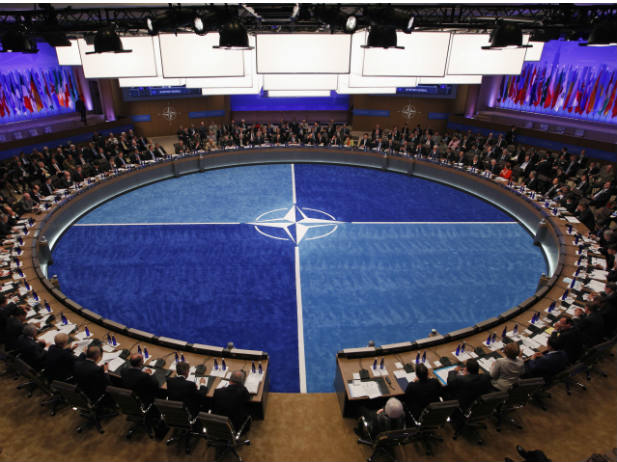
From Joshua W. Busby, Jonathan Monten, and William Inboden, Foreign Affairs: [H]ow deep is the partisan divide over the place of multilateralism in U.S. foreign policy? To explore this question, in the past year we sent a survey to foreign policy professionals: 50 Republicans and 50 Democrats, who had served in a mid-level or higher foreign policy position in the Clinton, Bush, or Obama administrations, or on Capitol Hill. The respondents included 23 Democrats and 20 Republicans.
The results of our study reveal that the parties are not as divided about multilateralism as the conventional wisdom suggests. First, strong majorities of both Republican and Democratic respondents said they believed that working closely with other nations serves U.S. interests and makes the country’s foreign policy more effective. Second, foreign policy leaders from both parties agreed that international economic institutions and free trade agreements are valuable, and that working with regional and global multilateral organizations such as NATO and the UN is important.
Several institutions that have their roots in the end of World War II enjoy robust bipartisan support. Large majorities of the Democrats and Republicans surveyed hold favorable views of the World Bank, the International Monetary Fund, and the World Trade Organization. Likewise, both groups held strongly favorable views of NATO and support bilateral alliances with traditional partners. Even some multilateral initiatives of more recent vintage enjoyed bipartisan favorability, such as the U.S.-India relationship, NAFTA, and the Global Fund to Fight AIDS, Tuberculosis, and Malaria.
Although the parties broadly agreed on the importance of multilateralism, however, they weighed the decision to join in multilateral groupings differently. Republicans, for example, were more sovereignty-minded in their multilateralism. They universally agreed on the need to preserve the country’s freedom of action and overwhelmingly affirmed that protecting U.S. sovereignty is important (94.7 percent). They were often willing to forgo a degree of sovereignty if a multilateral policy appeared to be effective, and, in turn, they generally opposed a multilateral initiative that they believed would undermine sovereignty without delivering sound policy outcomes.
A majority of Democrats still agreed on the need to preserve freedom of action and to protect U.S. sovereignty, but they were less unified on the question than Republicans were. Instead, they tended to be more concerned with how well multilateral opportunities addressed the vulnerabilities created by interdependence, such as the risk of financial contagion. And for Democrats, policy effectiveness hinged more on whether international partners view an approach as legitimate. They uniformly agreed that the United States needed to enlist other nations. They also uniformly agreed that the United States cannot solve most problems alone. The Republicans surveyed were not unanimous on the question of legitimacy (60 percent) or on the value of problem-solving with others (70 percent), although these considerations were still supported by the majority of the Republicans surveyed. . . .
Foreign policy partisanship may be an enduring theme in American politics, but so is bipartisan agreement on multilateral initiatives. At the outset of the Cold War, Republican Senator Arthur Vandenberg led his party to give crucial backing to Truman administration initiatives such as the Marshall Plan and NATO. Later, the Ford administration negotiated and signed the Helsinki Accords, which were designed to improve relations between the First and Second Worlds. The agreement overcame initial controversy — it was at first perceived as recognition of Soviet domination of Eastern Europe — to enjoy substantial support from congressional Democrats and the Carter administration. And more recently, the Obama administration embraced PSI, which was first developed by the Bush administration.
The commitment of policymakers in both parties to multilateral engagement may help explain the continuities in foreign policy across multiple presidential administrations. Think of the similarities between Bush and Obama administration policies toward Asia, on support for the WTO and NATO, and on the P5 plus 1 process for Iran’s nuclear program. All are initiatives that balance policy effectiveness, sovereignty, and interdependence. In terms of their Asia policies, both the Bush and Obama administrations attempted to allay regional allies’ fears of China’s rise and ambitions through a mix of bilateral security guarantees and participation in regional organizations. On Iran, both the Bush and Obama administrations attempted to use a combination of UN Security Council resolutions, IAEA inspections, increased bilateral security commitments to Persian Gulf countries, and multilateral sanctions to persuade the Iranian regime to give up its suspected nuclear weapons program. . . .
NATO Democrats Republicans
Favorability 90.9% 85%
Agreement
We should always use NATO 50% 10%
Use NATO when we can 45.5% 78.9%
NATO ineffective 4.5% 25%
*Bolded numbers in the tables represent statistically significant differences
Joshua W. Busby is Assistant Professor at the Lyndon B. Johnson School of Public Affairs at the University of Texas-Austin, Jonathan Monten is Assistant Professor in the Political Science Department at the University of Oklahoma, and William Inboden is Assistant Professor at the Lyndon B. Johnson School of Public Affairs. (photo: Jim Young/Reuters)
Image: Reuters%206%203%2012%20NATO-Summit.jpg
